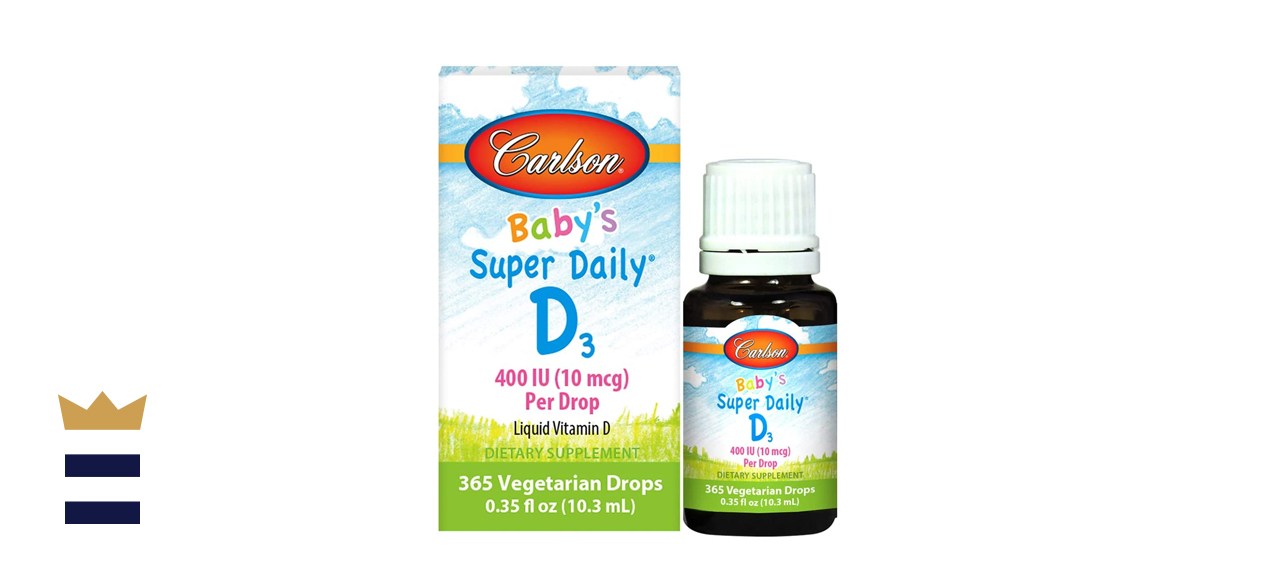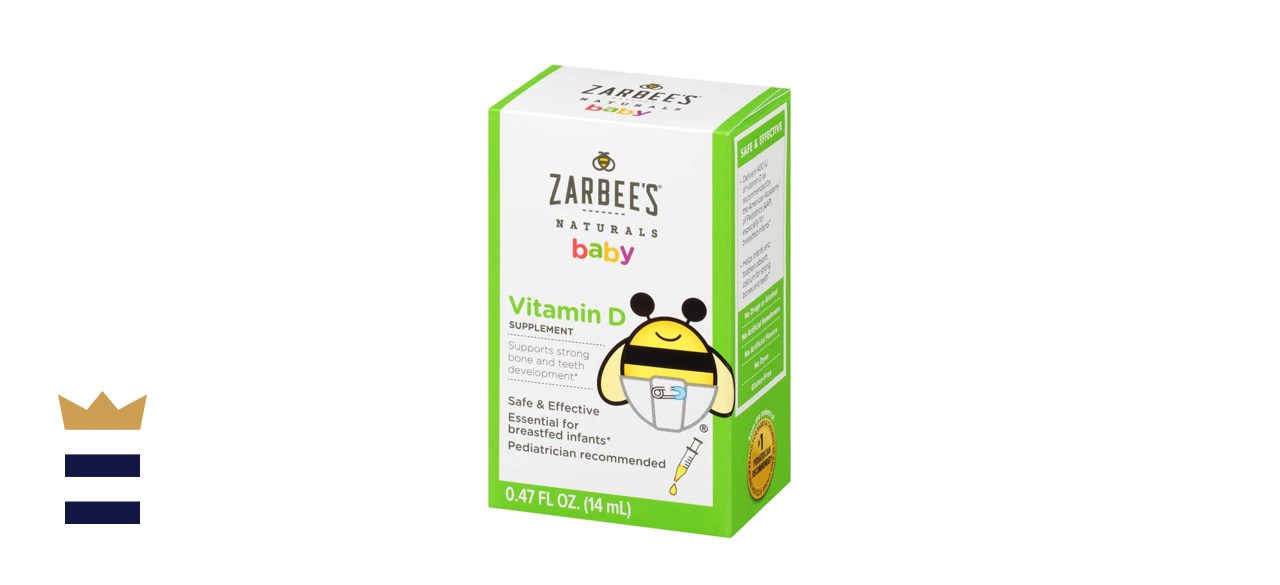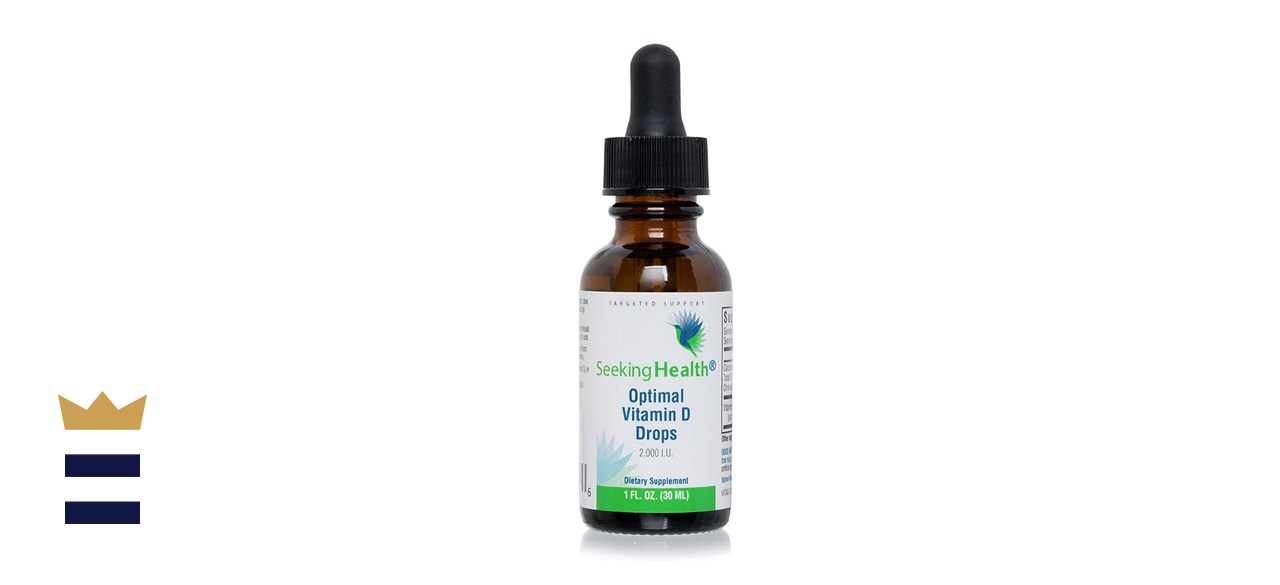Which vitamin D drops are best?
Vitamin D is a unique vitamin in that your body can synthesize it naturally through adequate exposure to the sun. Unfortunately, specific conditions need to be met for most people to produce sufficient vitamin D to see the optimal health benefits it provides. Persons living in a very northern region, for example, are highly unlikely to have enough direct sunlight during the winter months to produce vitamin D. Sunscreen also prevents sunlight absorption, which synthesizes vitamin D in the body, so avoiding its application is recommended even if you live in a temperate climate region.
The Carlson Baby’s Super Daily D3 Baby Vitamin D Drops, when supplemented daily, provide the recommended dosage by the American Academy of Pediatrics. The product is suitable for vegetarians and is free of artificial preservatives.
What to know before you buy vitamin D drops
Vitamin D for babies and children
Babies require 400 International Units of vitamin D daily from birth to 18 months of age for the healthy development of their bones and teeth. Without meeting their daily vitamin D intake, they risk a condition called rickets or soft bones. Unfortunately, breastmilk does not contain enough vitamin D to meet a babies’ intake requirements. While certain baby formulas will be fortified with vitamin D, the dosage may still not be sufficient and supplementing with drops may be necessary. Always speak to your pediatrician when determining the correct dosage of vitamin D for your baby. Never administer more or take more vitamin D than the recommended dosage.
Children ages 2 to 18 need up to around 600 International Units of Vitamin D daily, which contributes to the children’s bone health while assisting the body in absorbing calcium. Vitamin D also possesses immune-boosting qualities, invaluable for school-aged children while promoting heart and muscle health.
Vitamin D in pregnancy
Supplementing with vitamin D in pregnancy is thought to have many health benefits for mother and baby. Research indicates that adequate blood serum levels of vitamin D can reduce the risk of premature birth. For pregnant mothers, vitamin D also helps in the absorbtion of calcium from food and helps the baby develop. In addition, if you are pregnant and intend to breastfeed your baby, boosting your vitamin D levels is a good measure for your own health in the long term, as breastfeeding can deplete the mother’s vitamin and mineral stores over time.
Vitamin D in food
Rich levels of vitamin D can only be found naturally in a few foods. For instance, salmon is a great source of vitamin D, while tuna, egg yolks and mushrooms contain some vitamin D as well, often because they have been boosted with UV light treatment. Other foods and beverages are sometimes fortified with vitamin D, like milk, orange juice, yogurt and cereal. Always refer to the label to determine whether your food contains vitamin D and what the levels are. An adult diet is unlikely to provide enough daily vitamin D intake on its own, so vitamin D supplements are very beneficial.
What to look for in quality vitamin D drops
Absorption
Vitamin D, along with vitamins A, E and K, are fat-soluble, which means they need healthy fats to be fully absorbed in the body. Many vitamin D supplements are oil-based drops with coconut oil or olive oil as the carrier oil, which aids the body in proper absorption. Vitamin D3 for supplementation is most often derived from the lanolin of sheep’s wool. Vitamin D2 can sometimes be sourced from mushrooms treated with ultraviolet light but is considered less effective than vitamin D3.
Vitamin D and preexisting medical conditions
Persons with lactose intolerance or fat absorption issues, obese individuals or those with certain medical conditions may be more susceptible to vitamin D deficiency. This also refers to babies who are exclusively breastfed. Moreover, some people cannot receive sufficient vitamin D from the sun due to climate or skin conditions or have a higher melatonin concentration in their skin. If you think you might be experiencing a vitamin D deficiency, ask your primary care physician for a blood test to confirm and discuss your best dosage for correction.
Symptoms of a vitamin D deficiency
While many people may notice no symptoms from a vitamin D deficiency, some may experience a lack of energy, vague pains in their back or legs, hair loss, depression or increased likelihood of catching colds and viruses. There are also cases when noticeably slower healing of bodily wounds is evident. Furthermore, chronic vitamin D deficiency has also been linked to serious medical conditions, like diabetes, chronic fatigue and even cancer.
How much you can expect to spend on vitamin D drops
Vitamin D drops start under $10 on the lower end and can cost upward of $25 or more on the higher end, depending on the vitamin D concentration, the dosage and the brand you select.
Vitamin D drops FAQ
Is it safe to take more vitamin D than the daily recommended dosage?
A. There are currently no known benefits to taking a higher dose of vitamin D than the daily recommended intake by age group. However, consuming very high vitamin D levels can lead to digestive upset and other harmful side effects. Speak to your primary care physician or pharmacist for the correct dosage and never give children more than it is recommended.
What are some other essential vitamins and minerals?
A. Vitamins A, C, E, K and each of the eight B vitamins are all essential to human health. B-complex vitamins are sometimes available as one supplement, and they typically contain B1, B2, B3, B5, B6, B7, B8 and B12. Always consult a medical professional before beginning a new course of vitamin supplements to ensure they don’t interact negatively with one another or interfere with any prescription medications.
What’re the best vitamin D drops to buy?
Top vitamin D drops
Carlson Baby’s Super Daily D3 Baby Vitamin D Drops
What you need to know: Carlson Baby’s Super Daily D3 Vitamin D Drops provide a daily 400 International Units dose of vitamin D in a single drop, with enough doses for one child to last the entire year.
What you’ll love: These drops have no flavour whatsoever, which is ideal for children. In addition, they are available at a reasonable price per volume and last a long time.
What you should consider: Some parents found the applicator difficult to use.
Where to buy: Sold by Amazon
Top vitamin D drops for the money
Zarbee’s Naturals Baby Vitamin D Supplement
What you need to know: Zarbee’s Naturals Baby Vitamin D Supplements are sold at an extremely budget-friendly price and are much beloved by parents everywhere for their lack of artificial flavoring and coloring.
What you’ll love: These vitamin D drops are easy for babies to ingest and aren’t full of unnecessary filler ingredients.
What you should consider: Some reviewers indicated that they found administering the proper dosage to be confusing.
Where to buy: Sold by Amazon
Worth checking out
Seeking Health Optimal Vitamin D Drops
What you need to know: These adult vitamin D drops by Seeking Health are a high dose supplement made using pure olive oil.
What you’ll love: This product is great for people with vitamin D deficiency and is a cheaper alternative than some high-dose products.
What you should consider: Some users may feel burning in their mouth and throat and a peppery taste.
Where to buy: Sold by Amazon
Sign up here to receive the BestReviews weekly newsletter for useful advice on new products and noteworthy deals.
Ashley Britten writes for BestReviews. BestReviews has helped millions of consumers simplify their purchasing decisions, saving them time and money.
Copyright 2021 BestReviews, a Nexstar company. All rights reserved.




